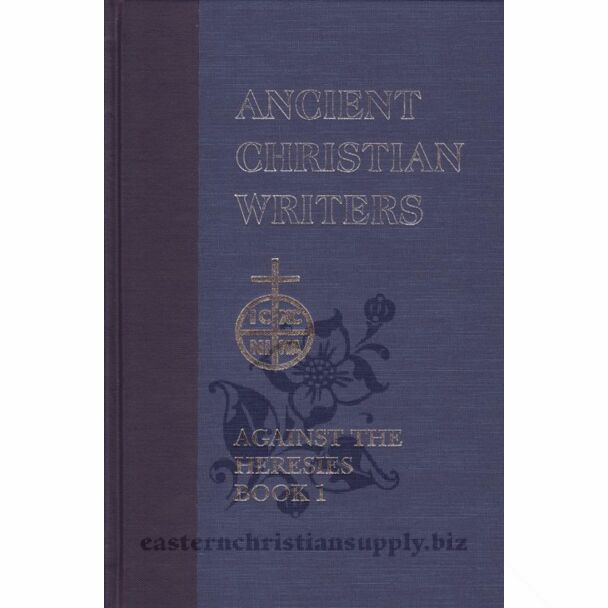Against the Heresies, Volume I, Book I #55
St. Irenaeus of Lyons
Translated and Annotated by Dominic J. Unger, O.F.M. Cap.
With Further Revisions by John J. Dillon
Translated and Annotated by Dominic J. Unger, O.F.M. Cap.
With Further Revisions by John J. Dillon
Publication Data: New York, NY/Mahwah, NJ: Paulist Press, 1992
Format: hardcover
Number of Pages: x + 300
Dimensions (l × w × h): 22.2 cm × 14.6 cm × 2.8 cm
ISBN-10: 0‒8091‒0454-7
St. Irenaeus of Lyons
Translated and Annotated by Dominic J. Unger, O.F.M. Cap.
With Further Revisions by John J. Dillon
No. 55 of Ancient Christian Writers: The Works of the Fathers in Translation
“It is this work, commonly called Adversus haereses, or, Against the Heresies, which established Irenaeus as the most important of the theologians of the second century and merits for him the title of founder of Christian theology. The Adversus haereses is a detailed and effective refutation of Gnosticism, and it is a major source of information on the various Gnostic sects and doctrines.”
—“Introduction”
CONTENTS
INTRODUCTION
Title and Authenticity
Time of Composition
Irenaeus’s Readers
Purpose and Plan of Adversus Haereses
Style
Scripture and Tradition
Manuscript History
Printed Editions
TEXT
Preface
Chapter 1: The Valentinians’ Absurd Explanation of the Origin of the Aeons
Chapter 2: The Defection of Wisdom outside the Fullness and Her Restoration by Limit. The Emission of Christ and the Formation of Jesus
Chapter 3: The Valentinians Misuse the Scriptures in Support of Their Errors
Chapter 4: The Formation of Achamoth and of the Material World from Her Passion
Chapter 5: The Formation of Demiurge and of Man
Chapter 6: The Threefold Element in Persons. The Formation of the Savior. Salvation is through Knowledge, Hence Good Works are Useless
Chapter 7: The Three Classes of Persons and Their Eternal Lot
Chapter 8: The Valentinians Pervert the Scriptures in Order to Prove Their Fabrications outside the Fullness
Chapter 9: Refutation of the Gnostic Use of the Scriptures
Chapter 10: The Rule of the Truth Is One in the Church Throughout the World
Chapter 11: The System of Valentinus and His Followers
Chapter 12: Tenets of the Followers of Ptolemaeus and Colorbasus
Chapter 13: The Deceitful Arts and Wicked Practices of Marcus
Chapter 14: The Marcosian System in Numbers and Letters
Chapter 15: The Account of Silence to Marcus about the Generation of the Twenty-Four Characters of Jesus
Chapter 16: The Absurd Interpretations of the Marcosians
Chapter 17: The Marcosian Theory That Created Things Were Made after the Pattern of the Invisible Beings
Chapter 18: The Marcosians Distort Passages of the Pentateuch to Support Their Fabrications about Creation
Chapter 19: The Marcosians Allege the Scriptures Prove That First-Father Was Unknown before Christ’s Coming
Chapter 20: The Marcosians Use Apocryphal and Spurious Writings, and They Pervert the Gospels
Chapter 21: The Heretical Notions about Redemption
Chapter 22: Deviations of the Heretics from the Ancient Faith
Chapter 23: The Tenets and Practices of Simon Magus and Menander
Chapter 24: The Errors of Saturninus and Basilides
Chapter 25: The Tenets of Carpocrates
Chapter 26: Tenets of Cerinthus, of the Ebionites, and of the Nicolaitans
Chapter 27: Tenets of Cerdo and Marcion
Chapter 28: Tenets pf the Encratites, Tatian, and Others
Chapter 29: The Barbeliotes
Chapter 30: Tenets of the Ophites
Chapter 31: Tenets of the Cainites
Conclusion
NOTES
List of Abbreviations
Notes to Introduction
Notes to Text
INDEXES
Old and New Testaments
Authors
General Index
Format: hardcover
Number of Pages: x + 300
Dimensions (l × w × h): 22.2 cm × 14.6 cm × 2.8 cm
ISBN-10: 0‒8091‒0454-7
St. Irenaeus of Lyons
Translated and Annotated by Dominic J. Unger, O.F.M. Cap.
With Further Revisions by John J. Dillon
No. 55 of Ancient Christian Writers: The Works of the Fathers in Translation
“It is this work, commonly called Adversus haereses, or, Against the Heresies, which established Irenaeus as the most important of the theologians of the second century and merits for him the title of founder of Christian theology. The Adversus haereses is a detailed and effective refutation of Gnosticism, and it is a major source of information on the various Gnostic sects and doctrines.”
—“Introduction”
CONTENTS
INTRODUCTION
Title and Authenticity
Time of Composition
Irenaeus’s Readers
Purpose and Plan of Adversus Haereses
Style
Scripture and Tradition
Manuscript History
Printed Editions
TEXT
Preface
Chapter 1: The Valentinians’ Absurd Explanation of the Origin of the Aeons
Chapter 2: The Defection of Wisdom outside the Fullness and Her Restoration by Limit. The Emission of Christ and the Formation of Jesus
Chapter 3: The Valentinians Misuse the Scriptures in Support of Their Errors
Chapter 4: The Formation of Achamoth and of the Material World from Her Passion
Chapter 5: The Formation of Demiurge and of Man
Chapter 6: The Threefold Element in Persons. The Formation of the Savior. Salvation is through Knowledge, Hence Good Works are Useless
Chapter 7: The Three Classes of Persons and Their Eternal Lot
Chapter 8: The Valentinians Pervert the Scriptures in Order to Prove Their Fabrications outside the Fullness
Chapter 9: Refutation of the Gnostic Use of the Scriptures
Chapter 10: The Rule of the Truth Is One in the Church Throughout the World
Chapter 11: The System of Valentinus and His Followers
Chapter 12: Tenets of the Followers of Ptolemaeus and Colorbasus
Chapter 13: The Deceitful Arts and Wicked Practices of Marcus
Chapter 14: The Marcosian System in Numbers and Letters
Chapter 15: The Account of Silence to Marcus about the Generation of the Twenty-Four Characters of Jesus
Chapter 16: The Absurd Interpretations of the Marcosians
Chapter 17: The Marcosian Theory That Created Things Were Made after the Pattern of the Invisible Beings
Chapter 18: The Marcosians Distort Passages of the Pentateuch to Support Their Fabrications about Creation
Chapter 19: The Marcosians Allege the Scriptures Prove That First-Father Was Unknown before Christ’s Coming
Chapter 20: The Marcosians Use Apocryphal and Spurious Writings, and They Pervert the Gospels
Chapter 21: The Heretical Notions about Redemption
Chapter 22: Deviations of the Heretics from the Ancient Faith
Chapter 23: The Tenets and Practices of Simon Magus and Menander
Chapter 24: The Errors of Saturninus and Basilides
Chapter 25: The Tenets of Carpocrates
Chapter 26: Tenets of Cerinthus, of the Ebionites, and of the Nicolaitans
Chapter 27: Tenets of Cerdo and Marcion
Chapter 28: Tenets pf the Encratites, Tatian, and Others
Chapter 29: The Barbeliotes
Chapter 30: Tenets of the Ophites
Chapter 31: Tenets of the Cainites
Conclusion
NOTES
List of Abbreviations
Notes to Introduction
Notes to Text
INDEXES
Old and New Testaments
Authors
General Index
Write Your Own Review





